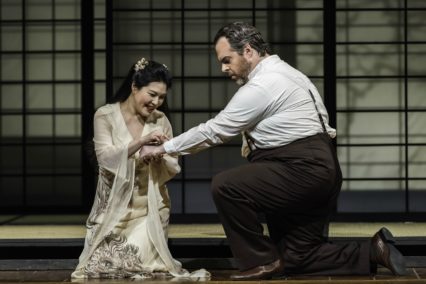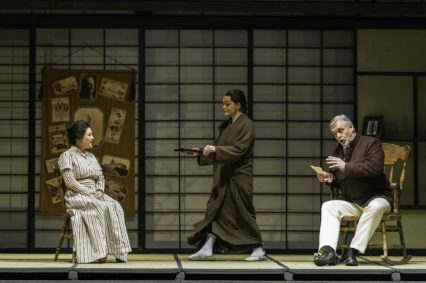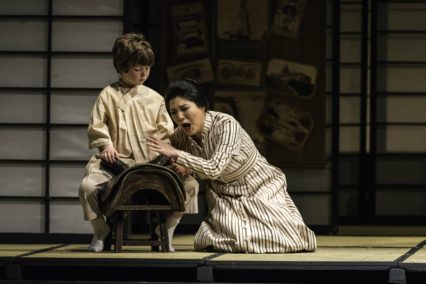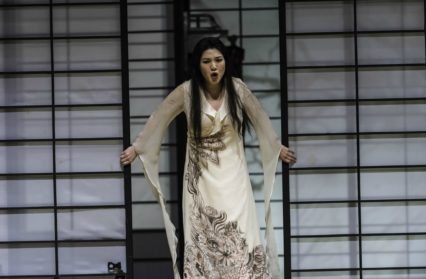Nigel Jarrett is at the Wales Millennium Centre in Cardiff to review a revival of Welsh National Opera’s Madam Butterfly by Joachim Herz.
When they finally come to break the sets of Welsh National Opera’s 1978 production of Madam Butterfly, and for whatever reason, there’ll be heartache all round. It’s the company’s longest-running show. After many revivals and at least one refurbishment, it still looks as if it can keep on keeping on. How to account for its longevity: well, according to statistics, Madam Butterfly and its cute japonaiserie vies with Bizet’s Carmen as the most popular opera ever written, and Welsh National Opera in recent years has presented only one sturdy Carmen; it’s an opera difficult to get right. But, almost forty years ago, it assembled a dream team, led by German director Joachim Herz, to create a Butterfly perfect in every particular, even a musicological one.

Herz collaborated with the company’s then chorus master, Julian Smith, to devise a score constructed from the first three of Puccini’s five versions of the opera – effectively, and including reinstatements, Puccini’s unrevised original. With pastel-sepia visuals created by Reinhart Zimmermann’s sets in combination with Eleonore Kleiber’s costumes, and restrained lighting by John Waterhouse, the stage was set for Herz to reinforce the opera’s theme of culture and personality clash. For the company’s Spring season, it’s been lovingly unveiled once more by revival director Sarah Crisp, in what, since his death, has been a memorial to Herz and the other two, who predeceased him. The production will cast a long shadow; memories of it will probably have to have dwindled to nought before the company thinks of commissioning a new version.
For the first time that anyone can remember, this revival includes in the title role of Cio-Cio-San, a singer who looks the part. South Korean soprano Karah Son, in her Welsh National Opera début, approximates to the young, petite geisha of the story. This does not mean she is definitive; other singers, notably Amanda Roocroft a decade ago and Helen Field in earlier outings, brought a maturity to the part that gave it additional strength of character, and which in turn made Butterfly’s tragedy that much more difficult to take. Whatever her stature and lineaments, it’s always a wonder why she would fall for the beastly Pinkerton. Butterfly, however, clearly has an agenda of her own, bolstered by the Americana with which she’s surrounded herself; other singers in the part have suggested that she is no better than she ought to be. But that’s not what Herz intended. He has Pinkerton crassly photographing everything about the weird surroundings of the okiya in which his exotic intended lives, and viewing members of her family as incomprehensible oddities.

WNO newcomer Jonathan Burton’s Pinkerton seemed as much out of his depth as insensitive and uncaring. Inclusion of the aria Addio, fiorita asil, not in Puccini’s first effort and thus missing from Smith’s reconstruction, would have given this Pinkerton particularly a redemptive loophole. Son delivered thrilling top notes, and if these seemed goals to be reached from a more measured, over-tentative, middle register, they were at least full of passion. The delivery of her iconic Un bel di, vedremo was beautifully controlled, a reflection also of how veteran conductor Lawrence Foster dictated events in the pit, from which arose clearly the ravishing sounds and subtleties of Puccini’s score. They were perhaps not as bright and opulent as Julian Smith himself used to insist on when he was conducting as the company’s head of music. Subtlety is everwhere in Herz’s production, especially where they shift perceptions just a little to make his points, not least in establishing the character of Kate Pinkerton, who in Sian Meinir’s portrayal especially was a woman on a mission with a bungling spouse.
Burton’s is thankfully not an overweening voice for a big tenor and he dealt even-handedly with the duetting, in which Pinkerton and Butterfly come close to genuine and unpredicated feeling. Not even Herz could subvert that, because Puccini’s music is so powerful and manipulative. David Kemspter as Sharpless, the American consul, and Rebecca Afonwy-Jones as Butterfly’s servant, Suzuki, were both in authoritative voice. Such vocal authority perhaps makes Sharpless’s ambivalence more difficult to convey – though conveyed it was – but it often made Suzuki’s loyalty so fierce as to be incandescent. Simon Crosby Buttle ensured that Goro, the marriage broker, was suitably contemptible. All the smaller but, in the pictorial scheme of things, significant parts were just so, particularly Richard Wiegold’s eruption as the Bonze, Butterfly’s condemnatory high priest.

From the start in 1978, the choreography of movement in this production has been central, and something to which revivals have always given serious attention. Joachim Herz’s was both a moral and pictorial vision in which the smallest blemish is magnified. So full marks to Leo Adams, as Butterfly’s child, deftly pulling a blindfold down to cover his eyes after his mother, on route to self-immolation, had tied it around his forehead. What presence of mind!
This was as rounded and faithful a revival as could be hoped for, proving that Joachim Herz’s production is still in business. Not all Butterflys bring in the crowds time and again. This one does – and probably will again.
Wales Millennium Centre, Cardiff, 10 February 2017
Header photo of Karah Son (Cio-Cio-San) by Jeremy Abrahams
Nigel Jarrett is a former daily-newspaperman and a winner of the Rhys Davies Prize for short fiction and the Templar Shorts prize. He is a regular contributor to Wales Arts Review, and the author of five books, including the widely-praised story collection, Funderland. Templar published his story pamphlet, A Gloucester Trilogy, last year. We was formerly music critic of the South Wales Argus newspaper.



 Enjoyed this article? Support our writers directly by buying them a coffee and clicking this link.
Enjoyed this article? Support our writers directly by buying them a coffee and clicking this link.







